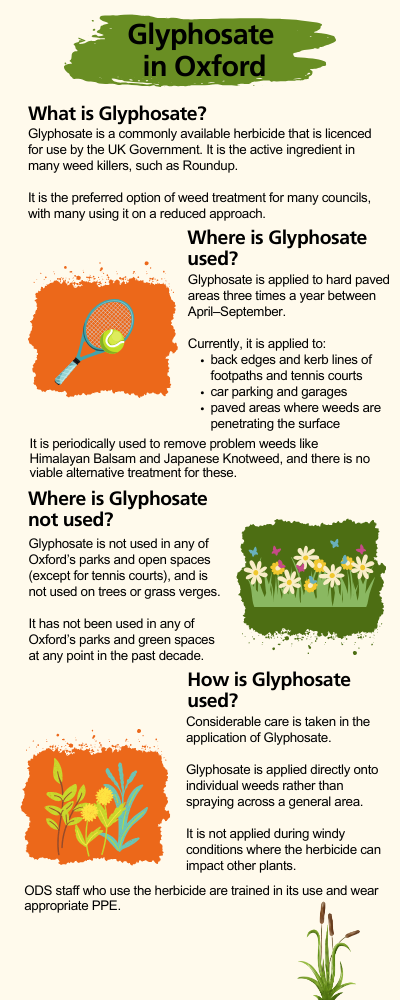Glyphosate is a commonly available herbicide that is licensed for use in the UK by Government. It is the active ingredient in many weed killers, such as Roundup.
Our wholly-owned direct services company, ODS, uses glyphosate selectively to control weeds on highways, streets and other paved areas. It is used to help protect hard paved areas which can be damaged by weeds growing up through cracks.
In Oxford, glyphosate is used in a limited and carefully controlled way, to minimise any impact on biodiversity and the environment.

Where is Glyphosate used?
Glyphosate is applied to hard paved areas three times a year between April–September and we limit its use.
Therefore, we only use glyphosate on:
- back edges and kerb lines of footpaths and tennis courts
- car parking and garages
- paved areas where weeds are penetrating the surface
- to remove problem weeds like Himalayan Balsam and Japanese Knotweed, as there is no viable alternative treatment for these
Glyphosate is not used in parks and open spaces (except for park tennis courts) – including on trees and grass verges. It has not been used in any of Oxford’s parks and green spaces at any point in the past decade.
How is Glyphosate used?
We make sure to take considerable care when applying glyphosate, and ODS follows best practice in accordance with Government regulations. Some of the steps we take include:
- only applying glyphosate directly onto individual weeds, rather than generally sprayed across a general area
- not applying glyphosate during windy conditions where the herbicide can impact other plants
- ensuring ODS staff are trained and wearing appropriate PPE
2023 Glyphosate review
In August 2023, we carried out a review into the use of glyphosate in Oxford. The review examined the cost and effectiveness of alternative weed treatments being trialled by other councils across the UK.
The review found that significant care was already being taken in the way glyphosate is used across Oxford.
It also found that controlled use of glyphosate was more cost-effective and efficient than alternative weed treatments such as hot water, hot foam, acetic acid, and manual weed control. It was especially effective in controlling invasive species like Japanese Knotweed that can negatively impact biodiversity and cause environmental harm.

